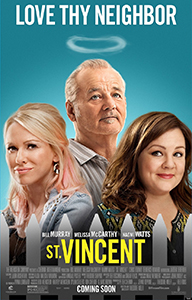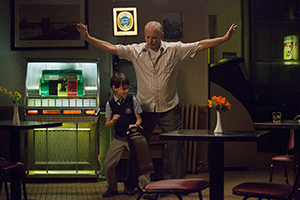If “St. Vincent” feels like a rehash of familiar movie trope, you’re right. The plot is neither original nor particularly engaging after so many takes. What makes it work is tweaks which create a deeper character and the comedy talent at play. “St. Vincent” is thematically weak, but strengthened by the presence of those involved.
Maggie (McCarthy), a single mother, moves into a new home in Brooklyn with her 12-year old son, Oliver (Lieberher). Forced to work long hours, she has no choice but to leave Oliver in the care of their new neighbor, Vincent (Murray), a retired curmudgeon with a penchant for alcohol and gambling. An odd friendship soon blossoms between the improbable pair. Together with a pregnant stripper named Daka (Watts), Vincent brings Oliver along on all the stops that make up his daily routine – the race track, a strip club, and the local dive bar. Vincent helps Oliver grow to become a man, while Oliver begins to see in Vincent something that no one else is able to: a misunderstood man with a good heart. (Synopsis by Weinstein)
Let’s get the obvious out of the way: only Naomi Watts pulls off a believable accent in character. Murray’s “Irish” brogue comes and goes; at times not even sounding like him. McCarthy’s accent is nearly indistinguishable except when she lays it on heavy for certain “Boston” words. For a movie set in Brooklyn, it occasionally begins to sound like a poor man’s “Good Will Hunting.” The kid has no accent. To be fair, Watts gets to play heavy Russian, which is more of a caricature than an accent. At least it is consistent.
But the come-and-go, awful accents are the only real shortcoming. Sure, the story is basically “About a Boy,” but each of the actors know their role so well that it elevates what is a fairly thin and generic script. Murray, playing the titular character, deftly moves between the focus and the background in the way only a veteran comedy actor can. He should be given special credit for structuring Lieberher as the center of most the humor. Murray deftly steps aside or plays the straight man to allow Lieberher to get the laugh. This is a break out role for Lieberher, who is the most memorable character in a strong cast.
McCarthy plays a fairly diminished role, but this is a different performance from her usual humor. She gets a couple of zingers in, but most of the time she provides the dramatic tension. There is a clever moment towards the end where she has to pull off a fairly complicated plot reversal with emotional range. She does splendidly. Hopefully this will open more doors for her beyond being the comedic sidekick.
The trick to getting this movie “right” is to engage the audience in the characters enough that they fall for the emotional traps. “St. Vincent” makes you care just enough, with sufficient laughs to make it worthwhile. It isn’t as good as “About a Boy,” but this is a solid delivery for the genre. The scenes with Chris O’Dowd as Oliver’s teacher are hysterical. Murray and McCarthy pull off their roles with enough resonance to draw you in. Even when Murray’s plot line gets a little hackneyed, he is a strong enough actor to reel it back in. Thankfully, Murray does just enough weird “Bill Murray stuff” to be funny without being a distraction. This isn’t Wes Anderson level Murray work. But it doesn’t need to be, and Murray is experienced enough to recognize that. At points it is noticeable that Murray isn’t in top form. Maybe this was little more than a money grab for him. Who knows? Murray is an enigma.
“See It/ Rent It/ Skip It”: See it. Go just for the Catholic schoolroom scenes. O’Dowd is a genius.
THREE STARS out of four.
Directed by Theodore Melfi
Rated PG-13 for mature thematic material including sexual content, alcohol and tobacco use, and for language.
Runtime: 1 hour and 43 mins.






I needed to get out of the house for a few hours the other night and I’ve always liked Bill Murray’s style, so I went and saw St. Vincent. I was not disappointed, it’s a real good movie. I’d give it 4/5 and put in the category of “dark comedy” as opposed to just “comedy.”